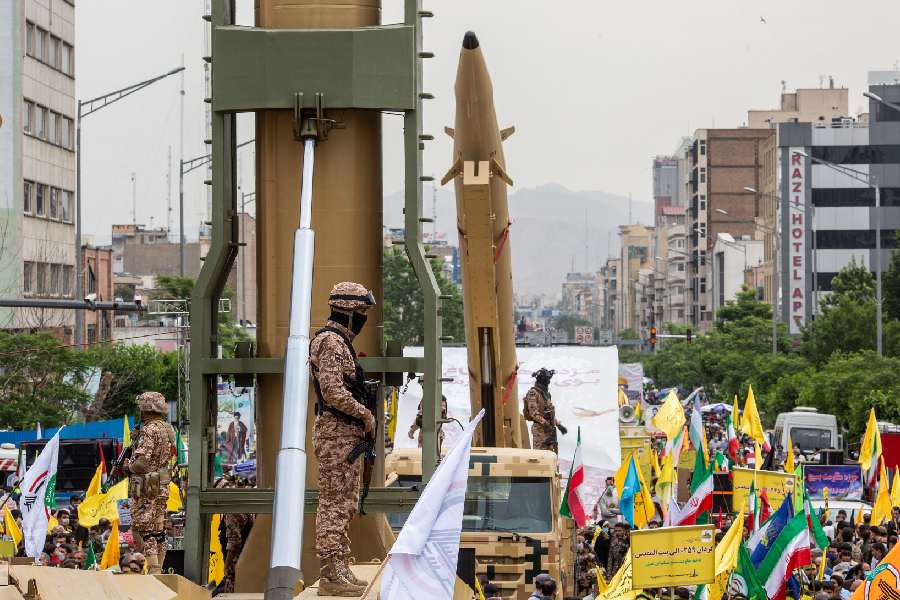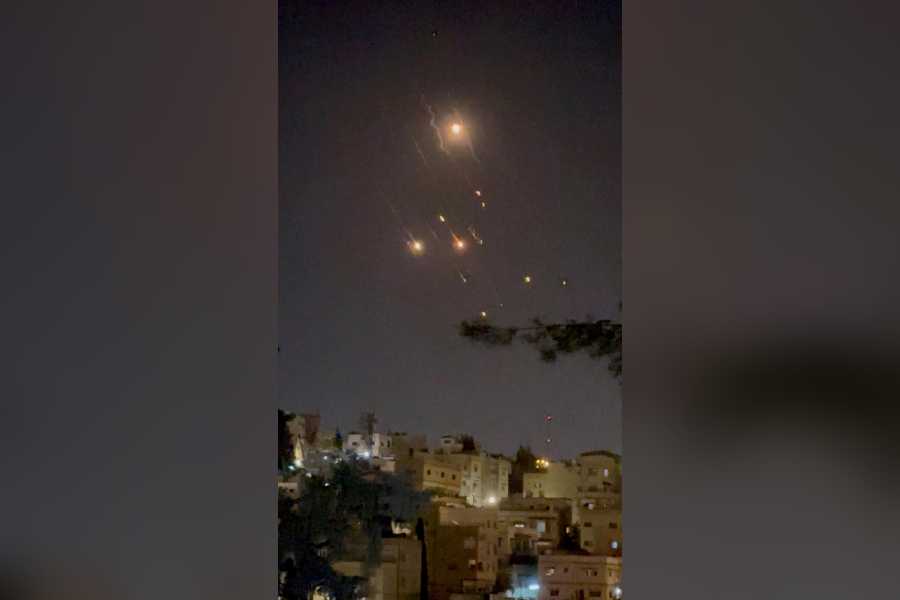Iran launched more than 200 drones, cruise missiles and ballistic missiles toward Israel on Saturday evening, the Israeli military said, in retaliation for a deadly Israeli airstrike on the Iranian Embassy complex in the Syrian capital this month.
The attack, which is believed to be the first direct Iranian assault inside Israel, threatened to open a volatile chapter in the long-running shadow war between the two nations.
The Israeli military spokesperson, Rear Adm. Daniel Hagari, said at a news briefing that the strikes had caused minor damage to an Israeli military base. The vast majority of Iran’s arsenal, he added, had been intercepted by Israel with “some assistance” from its allies.
“Only one little girl has been hurt,” he said, without giving further details.But Hagari called Iran’s strikes “a severe and dangerous escalation.” He added, “Our defensive and offensive capabilities are at the highest level of readiness ahead of this large-scale attack from Iran.”
Air-raid sirens sounded across Israel, loud booms were heard across Jerusalem and in the Golan Heights, and a video showed what appear to be Israeli air-defence interceptors in the sky above the Old City of Jerusalem.
President Joe Biden cut short a weekend trip to his vacation home in Delaware and returned to the White House to huddle with his national security team over the situation. A Defence Department official, speaking on the condition of anonymity to discuss operational matters, said U.S. forces were helping to shoot down Iranian drones, without providing more details.
“In accordance with our ironclad commitment to Israel’s security, U.S. forces in the region continue to shoot down Iranian-launched drones targeting Israel,” the Defence Department official said.
Britain’s defence secretary, Grant Shapps, said in a statement that additional British jets and air refuelling tankers had been deployed to bolster the country’s existing operations in Iraq and Syria, and its jets would “intercept” airborne attacks within range of its missions there.
Before the drones and missiles arrived, two Israeli officials who spoke on the condition of anonymity to discuss military intelligence said the targets were likely to be the Golan Heights and an Israeli air force base in the Negev Desert.
Hezbollah, the Iran-backed group in Lebanon, announced that it had also fired dozens of rockets at Israeli barracks in the Golan Heights, a plateau on Israel’s northeast border with Syria and Lebanon that has been occupied by Israel since the Six-Day War in 1967.
Hezbollah and Israel have been firing at each other ever since the Oct. 7 attack on Israel by another Iranian proxy group, Hamas, that led to the war in the Gaza Strip.
Prime Minister Benjamin Netanyahu of Israel met with his war Cabinet, according to his office. U.S. Defence Secretary Lloyd Austin spoke with Israel’s minister of defence, Yoav Gallant, on Saturday and made clear that Israel could count on full U.S. support to defend itself, said the Pentagon’s spokesperson, Maj. Gen. Patrick S. Ryder.
Iran’s Revolutionary Guard, which is responsible for securing Iran’s borders, said in a statement that it had launched “dozens” of drones and missiles toward Israel “in reaction to the Zionist regime’s crimes.” The Guard said in a later statement that it had hit military targets in Israel, warned the United States against getting involved and threatened more strikes if Iran or its interests were hit.
“We warn the United States terrorist government that any support or participation in attacking Iran’s interests will have a fierce response from Iran’s Armed Forces,” the statement said, warning Iran’s neighbours that if Iran were attacked from their territory, Iran would respond.
The strikes on Saturday came after a week of diplomacy and uncertainty about how far Iran would go in response to the Israeli attack in Damascus, the Syrian capital, on April 1 and whether it would risk starting an outright war with Israel.
Senior Iranian officials and military commanders had vowed to retaliate after the airstrike in Damascus, which killed three top Iranian commanders and four officers.
“We will make them regret this crime and similar crimes, with the help of God,” Iran’s supreme leader, Ayatollah Ali Khamenei, declared after the strike.
The U.N. secretary-general, António Guterres, strongly condemned Iran’s attacks and urged all parties “to exercise maximum restraint” to avoid further military escalation in the Middle East. “I have repeatedly stressed that neither the region nor the world can afford another war,” he said in a statement.The U.N. Security Council said it would hold an emergency meeting Sunday afternoon to discuss Iran’s attacks on Israel, said Malta’s U.N. mission, which holds the rotating presidency to the U.N. Israel’s ambassador to the U.N., Gilad Erdan, had requested the council session.
Iran’s attack came on the same day that its forces seized a container ship with links to Israel in the Persian Gulf. Adrienne Watson, a National Security Council spokesperson, called on Iran to release the vessel and its crew immediately, calling it “a blatant violation of international law.”
In anticipation of Iran’s counterattack, neighboring Jordan and Lebanon temporarily closed their airspace, as did Israel.
The Israeli military said all schools would be closed across the country and gatherings of more than 1,000 people limited from 11 p.m. Saturday to 11 p.m. on Monday. Israeli authorities also ordered residents of the Golan Heights, some areas of the Negev, and Eilat to remain close to protected shelters.
Zaki Heller, a spokesperson for Magen David Adom, an Israeli emergency response service, said by phone that medics treated a 10-year-old girl who was believed to have been wounded in the head by shrapnel in the Negev Desert and was in serious condition. About 20 other people were treated for anxiety or injuries suffered while seeking shelter, the group added.
Iran was split over how to respond after the Israeli strike in Damascus, a significant move between the two adversaries. Divisions over possible retaliation arose at an emergency meeting of Iran’s Supreme National Security Council, three Iranians familiar with the deliberations said.
Arguing that anything short of a direct response would be taken for weakness, some hard-line members said Iran should strike targets in Israel. Other Iranian officials called for continuing the policy of “strategic patience” and to retaliate through its proxy militias in the Middle East, the three Iranians said.
The Revolutionary Guard said Saturday that the attack on Israel had been ordered by Iran’s Supreme National Security Council, under the guidance of the senior military body that coordinates Iran’s armed forces.











